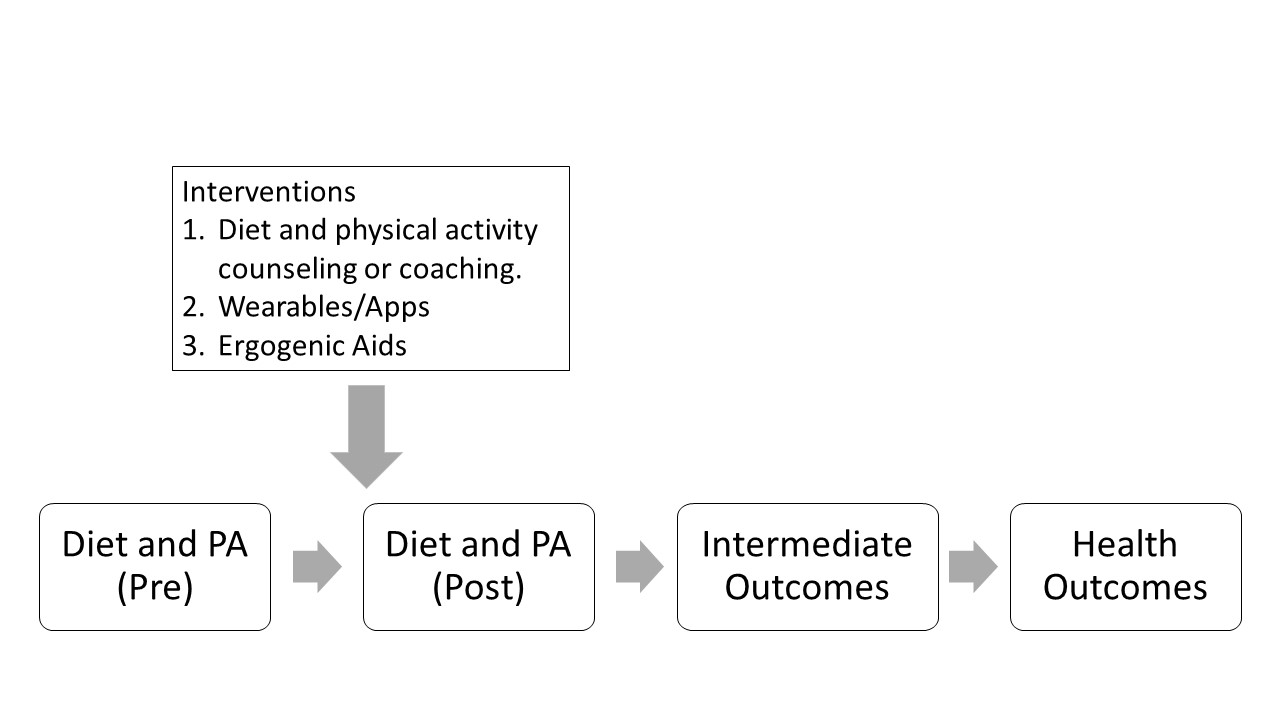Nutrition and Physical Activity: General Population (NPA-GP) Scoping Review (2020)
Nutrition and physical activity interventions have the potential to prevent and treat cardiometabolic risk factors. However, most adults living in the United States do not meet recommendations for fruit and vegetable intake or physical activity. Thus, it is important to examine the availability of research on effective nutrition and physical activity interventions for adults in the “general” population, which includes those with or without cardiometabolic risk factors.
The objective of nutrition and physical activity in the general population scoping review is to describe the extent, range and nature of literature examining interventions to maintain or improve nutrition, physical activity and related outcomes in individuals who are non- or recreational athletes with or without cardiometabolic disease.
Research Question
In non-athletes or recreational athletes with or without cardiometabolic disease, what is the extent, range and nature of literature examining assessment and intervention methods to improve or maintain both nutrition and physical activity and related outcomes?
Sub-Questions
For non-athletes or recreational athletes with or without cardiometabolic disease, what is the availability of research describing:
1. Individual-level nutrition and physical activity counseling or coaching provided by a nutrition or exercise practitioner to achieve or maintain adherence to dietary and physical activity recommendations and cardiometabolic and mental health outcomes?
- Which studies examine target populations trying to achieve (diagnosed disease) or maintain (non-diagnosed disease) cardiometabolic or mental health?
- Which types of practitioners are delivering the nutrition and physical activity interventions?
- Which behavioral counseling techniques (ex: motivational interviewing, transtheoretical model behavior change) are used to improve or maintain nutritional and physical activity and cardiometabolic or mental health outcomes?
2. A) Wearable technology and/or B) mobile application to achieve or maintain adherence to dietary and physical activity recommendations and cardiometabolic and mental health outcomes?
3. Effect of ergogenic aids on exercise/training outcomes, anthropometric measures and body composition?
- carbohydrate/electrolyte replacement (drinks, gels, chews, tablets [nuun])
- caffeine
- BCAA supplementation (leucine, isoleucine, valine)
- creatine supplements
- collagen supplements
- multivitamins
- omega-3 supplements
- exogenous ketones
Analytical Framework

Eligibility Criteria
Target Population: Adults (18 years of age or older)
Search Dates: Primary studies: 2005-May 4, 2020; Systematic Reviews/Meta-Analyses: 2015-May 4, 2020
Location: Countries with developed economies
Intermediate Outcomes: Dietary intake, physical activity, body composition (FM, FFM, BMD), anthropometrics, glucose homeostasis measures/pre-diabetes, BP, lipid profile, intermediate CVD measures (ex: IMT, FMD), CRP. Intermediate outcomes must be measured before and after the trial. Physical activity should be specified in METs.
Health Outcomes: Mortality, quality of life, CVD/events, type 2 diabetes, metabolic syndrome, malnutrition (overweight/obesity/underweight), anxiety disorders, depression, osteoarthritis, osteoporosis/osteopenia, joint pain.
Study Design Preferences: Systematic reviews and evidence-based practice guidelines; controlled clinical trials (RCTs, NRCTs).
Download the complete search criteria (PDF).
Scoping Review Conclusion
Considerable research, including primary studies and systematic reviews, is available describing the efficacy of mobile applications for nutrition and physical activity and ergogenic aids of interest. Practitioners can use recently published systematic reviews on these topics to guide practice. While there was consistent research published on the effects of nutrition and physical activity counseling or coaching provided by a dietitian and/or exercise practitioner, this research has not been synthesized for “general” population, including those with or without cardiometabolic risk. Systematic reviews examining the efficacy of interventions delivered by trained practitioners may help define the scope of practice for those working with the “general” population.
- There were 170 articles included in the analysis, including one evidence-based practice guideline, 30 systematic reviews, 134 randomized controlled trials and five non-randomized controlled trials.
- There were 48 articles reporting the effect of nutrition and exercise counseling from a dietitian and/or exercise practitioner, though exercise practitioners were heterogeneous between studies. There were studies available targeting participants with and without cardiometabolic risk factors, but only two systematic reviews were included. Systematic reviews are needed to guide nutrition and physical activity counseling or coaching for the general population.
- There were 36 articles available reporting the effect of mobile applications on nutrition and physical activity, including 12 systematic reviews published since 2015. In addition, there were 87 studies included that examined the effects of ergogenic aids of interest on anthropometric and body composition measures as well as exercise performance, including 17 systematic reviews.
The results of this scoping review are published in Rozga M, Jones K, Robinson J, et al. Nutrition and Physical Activity Interventions for the General Population with and without Cardiometabolic Risk: A Scoping Review. Public Health Nutr 2021 May 25;1-49
updated: 9/10/2020
Return to Nutrition and Physical Activity home page